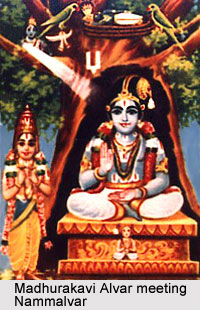 Madhurakavi Alvar, also known as Madhura Kavi Aazhwar, meaning Poet of Sweet Words, was a Tamil poet saint who existed during the 6th century to 9th century period. He is amongst the most renowned of the 12 Alvar saints of South India, who are popular for their association to Vaishnava tradition of Hinduism. Madhurakavi Alvar wrote 11 verses in complement of Nammalvar, his teacher (Guru) in the four thousand Divya Prabhandham. Madhurakavi is revered as the dawn Ushas before the sun rise of Nammalvar as he was born prior to Nammalvar, another one of the twelve Alvars. According legends Madhurakavi Alvar was a well educated and much traveled Brahmin poet who had a gift for music and composition. The compositions of Nammalvar were set to music by Madhurakavi Alvar. He is credited with the composition of Kanninum Siru Thaambu.
Madhurakavi Alvar, also known as Madhura Kavi Aazhwar, meaning Poet of Sweet Words, was a Tamil poet saint who existed during the 6th century to 9th century period. He is amongst the most renowned of the 12 Alvar saints of South India, who are popular for their association to Vaishnava tradition of Hinduism. Madhurakavi Alvar wrote 11 verses in complement of Nammalvar, his teacher (Guru) in the four thousand Divya Prabhandham. Madhurakavi is revered as the dawn Ushas before the sun rise of Nammalvar as he was born prior to Nammalvar, another one of the twelve Alvars. According legends Madhurakavi Alvar was a well educated and much traveled Brahmin poet who had a gift for music and composition. The compositions of Nammalvar were set to music by Madhurakavi Alvar. He is credited with the composition of Kanninum Siru Thaambu.
Early Life of Madhurakavi Alvar
Madhurakavi Alvar was born before Nammalvar (Swami Nammazhwar), in a Brahmin family in the divya desam known as Thirukkolur near Aazhwar Thirunagari, in the chitra star and in the month of Chittirai. The exact period of his birth cannot be ascertained, although it is believed that the poet saint was born in the period between 6th century and 9th century. The Perumal (Lord Vishnu) in this divya desam is known as Vaitha Maanidhi, meaning storage of great wealth. Madhurakavi Alvar was taught about the Vedas and was well versed in both Sanskrit and Tamil. He used to compose verses in the honour of Bhagavan that is Lord Vishnu. At a certain phase in his life, Madhurakavi decided to discard all the manacles of Samsara (cycle of birth, life, death and reincarnation) and struggle towards attaining Moksha (liberation from Samsara). In this quest, he commenced on a pilgrimage to the Vada Naattu Divya Desams such as Mathura, Ayodhya and others.
Meeting with Nammalvar
During his pilgrimage to Ayodhya, Madhurakavi Alvar he noticed a gleaming ball of fire in the sky, coming from the southern direction. He could not comprehend the rationale for this phenomenon. He followed the gleaming beacon that led him to Aazhwar Thirunagari. Madhurakavi had earlier heard about a 16 year old boy named Nammalvar, who meditated under a Tamarind tree since his birth, without eating any food and emitted a divine radiance. He went directly to the seat of Swami Nammalvar (Thiru Puli Aazhwar) and discovered Nammalvar in a trance state.
In an attempt to test Nammalvar, Madhurakavi Alvar threw a stone and on hearing the sound, Nammalvar opened his eyes and smiled. Madhurakavi desired to test the Swami for his spiritual affluence and thus asked a question. After receiving a genuine answer from Nammalvar, Madhurakavi Alvar realized his greatness and determined to become his disciple. He remained with Swami Nammalvar for the rest of his life as his follower.



















